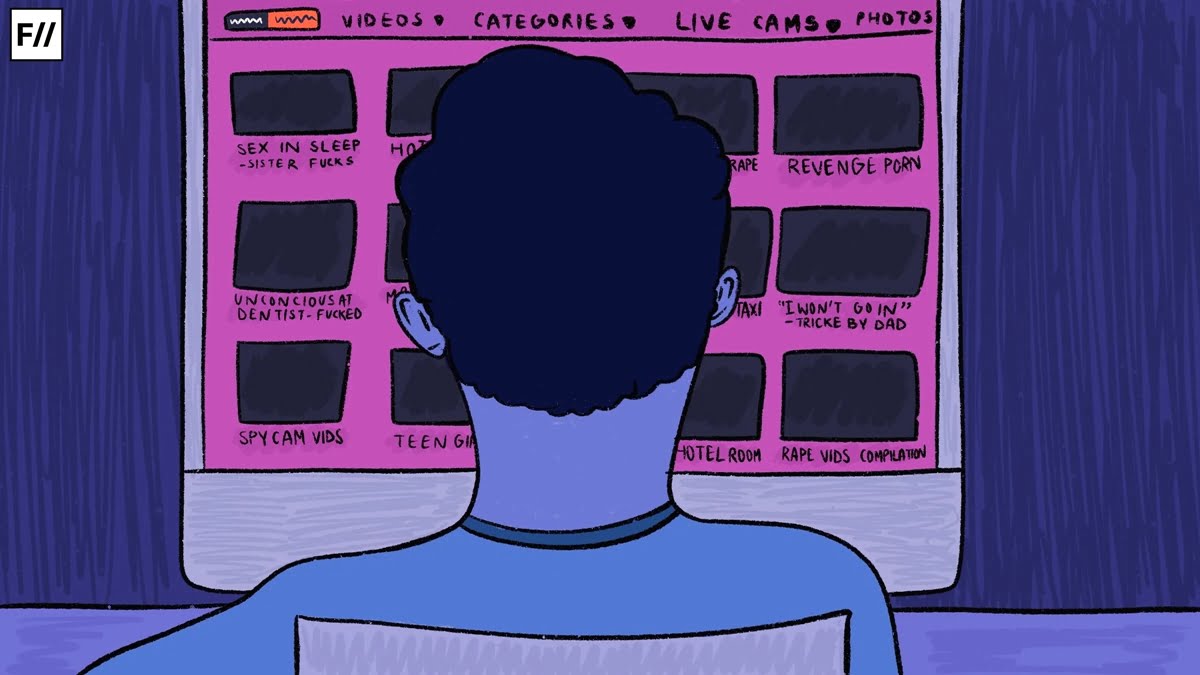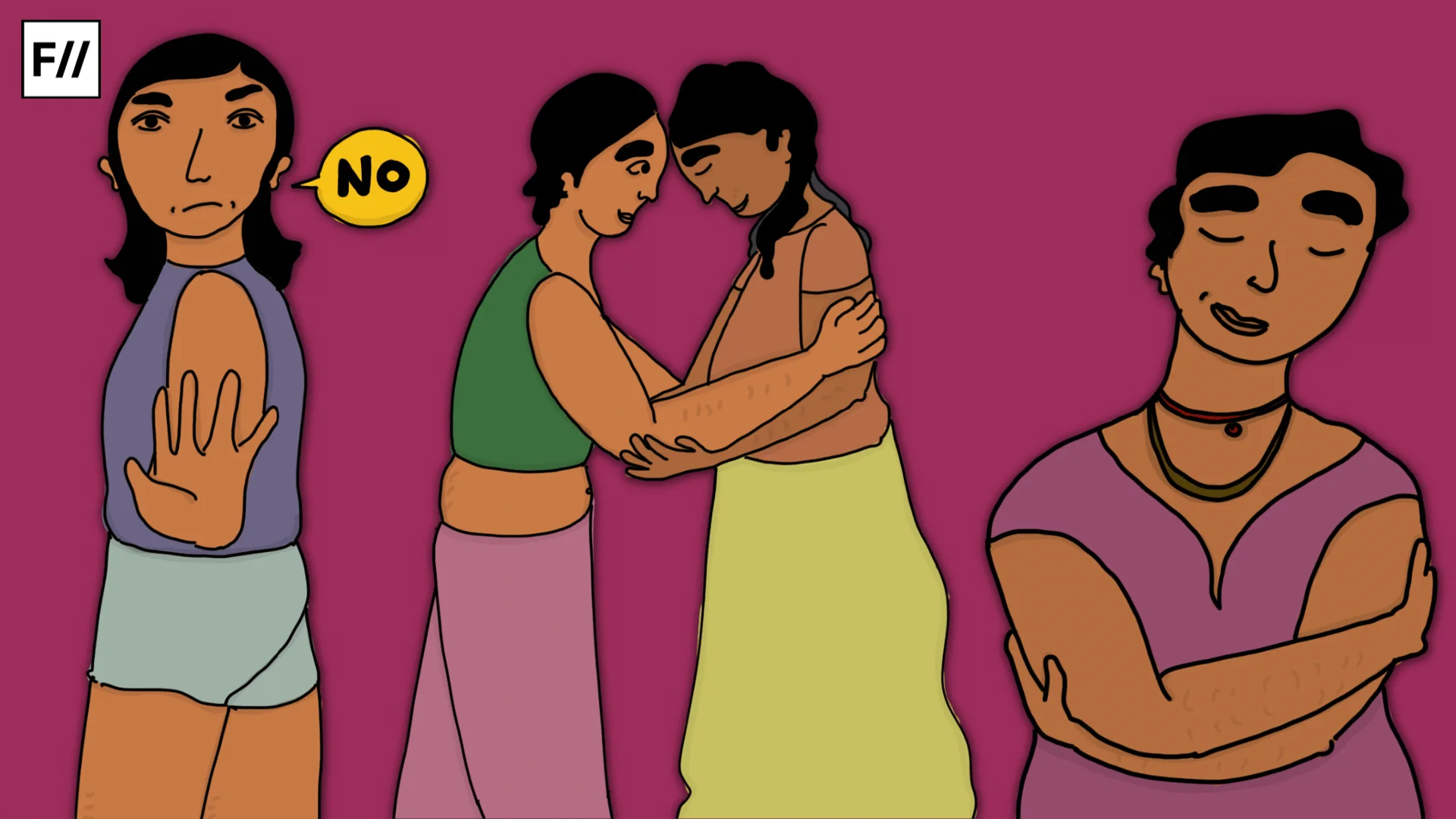Trigger Warning: Rape, Trafficking and Sexual Assault
Purity culture and hypersexualisation are different sides of the same coin. One demands control over women’s sexuality by repression and the other demands control by making it an object of male voyeurism. In both instances, patriarchy commands and asserts a submission of agency. However, it is most frequently the latter that has found comfortable manipulation as agency in feminist movements across the globe. It is imperative that we question why women are the only group of oppressed people whose emancipation is so closely linked with their sexual expression.
Pornography is one instance of the same. While pornography has always existed in society, a billion dollar porn industry is a modern phenomena. Anti-porn feminism emerged in the wake of digitisation of pornography and the beginning of what would be an eventual transformation of digital porn into a multi-billion dollar industry. It was actively in action throughout the 1970s and 1980s, but with the acceleration in neoliberalism of the 1990s, it drastically declined. Anti-porn (mostly radical) feminists were labelled sex-negative in an era of feminism that was heavily influenced by liberalism. Individual choices, as opposed to mass liberation, became the forerunning feminist agenda.
Critics of this choice feminism question the economic consequences of locating feminist emancipation in free choice, in addition to questioning the degree of freedom in a free choice. Industries such as porn and beauty have grown monumentally in the recent years, complemented by feminist backings.
Critics of this choice feminism question the economic consequences of locating feminist emancipation in free choice, in addition to questioning the degree of freedom in a free choice. Industries such as porn and beauty have grown monumentally in the recent years, complemented by feminist backings. It is no mere coincidence that both these industries rely on the continuation of patriarchy to sell products that have led to billions of dollars in profits.
Pornography’s impact on gender relations in society can be categorised through its two phases: production and consumption.
Also read: Please Mind The Orgasm Gap: Inspecting Unchecked Patriarchy In Porn
Porn Production
Production of porn in a patriarchal economic and social system inevitably puts the porn actress at the risk of exploitation. Over the decades many former sex workers and porn actresses have come forward with their stories of abuse and coercion, the latest of which was Mia Khalifa. After revealing the financial and sexual coercion that was involved in her short duration at the industry, she was met with heavy criticism from pimp lobbies, sex trade expansionists, and porn consumers alike. Through vocal advocacy on all her social media channels, Mia has tried to highlight how the porn industry and the men who control it prey on young women.
Linda Boreman is another example of a porn actress turned anti-porn advocate. Boreman was one of the first pornographic actors in America in the 1970s. Despite one of her most famous pornographic films, ‘Deep Throat’, grossing over half a billion dollars, Boreman was never paid a penny. In a 1980 memoir, Boreman revealed that she was forced to perform in the movie at gunpoint by her abusive husband. “I’m not ashamed of my past or sad about it. And what people might think of me, well, that’s not real. I look in the mirror and I know that I’ve survived”, she mentions in a 1997 interview. Boreman spent the second half of her life working with prominent anti-porn feminists including Andrea Dworkin and Catherine MacKinnon. “When you see the movie Deep Throat, you are watching me being raped. It is a crime that movie is still showing; there was a gun to my head the entire time”, she states in an address to the congress.
The stories of Linda Boreman and Mia Khalifa, among many others, echo the voices of countless women in the porn industry and reflect the common theme of pimps and porn producers controlling the agency of porn actresses in the industry. In addition to coercion, human trafficking is also a very common occurence.
Trafficking Hub
In a horrific tale that shook many, an aggrieved mother found her 15 year old daughter who had been missing for a year through videos on PornHub. Additionally, more than 50 videos of the minor being sexually assaulted were uploaded across various porn sites. While the offenders were arrested, PornHub escaped any responsibility for not only sharing but also monetising the videos. With more than 10 billion ad impressions a day, PornHub is the world’s 10th most famous website. Fabian Thylmann, founder and former CEO of Mindgeek (the parent company of PornHub) has a net worth of more than 300 million USD. Atleast a considerable amount of the company’s wealth comes from the thousands of survivors and victims whose trauma has been immortalised on the internet forever through these websites.

Image Source: Twitter
One survivor (referred above) for instance, was 14 when she was raped and videos of the incident were uploaded on Pornhub. After repeated pleas to PornHub to take down the videos, they had to resort to imitating as a lawyer to get a response from the website.
In an interview to New York Times, a trafficking survivor recalls how Pornhub became her trafficker. After being adopted from China, she was trafficked by her adoptive family and was forced to appear on pornographic videos at the age of 9. Since PornHub allows for easy downloads, her videos continue to be uploaded and reuploaded on PornHub and other pornographic websites. In the article, she mentions that any search string for ‘young asian’ or ‘exploited teen’ will most likely show her videos. After the release of this article, Mastercard and Visa terminated their ties with PornHub. Shortly after, Pornhub disabled the download option on their website and announced that videos posted by unverified users will be removed.

Also read: Bodies Online: Image-Based Sexual Abuse Or ‘Revenge Porn’ In India
Globally, several anti-porn campaigns have been launched over the decades. TraffickingHub campaign is an online petition with over 2 million signatures demanding the shut down of ‘the largest porn website in the world accountable for enabling and profiting off of the mass sex trafficking and exploitation of women and minors’.
In addition to trafficking, digital pornography has surged revenge porn, wherein a sexual partner or a third party releases nude or pornographic content of a person without their consent, with the intention of maligning and harming the person.
In addition to trafficking, digital pornography has surged revenge porn, wherein a sexual partner or a third party releases nude or pornographic content of a person without their consent, with the intention of maligning and harming the person. Not Your Porn is a UK based campaign that firmly advocates for the abolishment of revenge porn as a genre. In an interview, the founder mentions that they want to regulate the commercialised porn industry and put legislation in place to make it illegal to profit and host revenge porn.
While pro-porn advocates try to shift attention to women who have enthusiastically consented to enter the industry, victims of rape and trafficking are not a mere minority in the porn world. Any debates on consent can be easily deconstructed when we detach feminist emancipation from individual choices and shift our focus on to systems that essentially require misogyny and patriarchy in order to smoothly sustain. Women in the industry are constantly at the risk of HIV, rectal and throat gonorrhea; tearing of the throat, vagina and anus; and chlamydia of the eye, which anti-porn feminist Dines mention is not a common workplace ailments and certainly not one that men are ever subjected to. Amanda Cawston mentions that appealing to the choice of individuals allows one to acknowledge that pornography may in fact require its performers to be harmed, however, such harms cease to be wrong via the magic of consent. Cawston adds that the industry appeal to ‘choice’ marks the issue to be about consent, which in a broadly liberal politico-legal context, will strongly favour an anti-paternalist presumption.
Porn Consumption
The mass consumption of porn has monumental impacts on sexual relations in society. Hardcore pornography is riddled with themes of violence, subjugation, and eroticising sexist gender relations. By eroticising rape, torture, cruelty and the objectification of women, pornography undermines prohibitions against rape and normalises violence and abuse. A UK survey found that 44% of males aged 11-16 who consumed pornography reported that online pornography gave them ideas about the kind of sex they wanted to try. The normalisation of hardcore and violent sex prioritising male pleasure and its advertisement to the younger people is extremely dangerous. In this sense, porn not only requires sexism to function but also contributes to its alleviation in society.
Themes of child pornography are also rampant and easily accessible through these websites. ‘Teen’ and ‘barely legal’ are one of the most searched categories of porn online. Robert Jenson perhaps sums it up perfectly when he says that mirrors can be dangerous, and pornography is a mirror. Pornography as a mirror shows us how men see women. It is unsettling to look into that mirror.
It is important to note that pornography is a consequence of patriarchy, and not the sexual liberation of women. It is hence imperative that any conversation about the harms of pornography focus on the misogyny and the abuse it promotes, rather than an imagined sexual freedom of women. Especially since true sexual liberation will compel us to reimagine the existence of sexual ties outside of misogyny. True sexual liberation will not teach 14-year-old girls that they must want violent sex to be desirable to men. True sexual liberation will not reproduce a male fantasised version of sex that borrows heavily from the patriarchal themes of subjugation and domination. True sexual liberation will be emancipatory for all women across geographies and class divides.
But before that becomes a reality it is urgent that industries that exploit sex workers and women financially and sexually be held accountable. In a world where ‘non-consent’ still remains a popular search category on PornHub and other porn websites (and a lousy attempt to renovate the word rape to detach it of its moral character), feminists must demand abolishment of industries that have set our movement back decades and harm women globally. In the words of Cawston, pornography is a mode of externalised sexism that provides a form of mediated domination and exploitation that bypasses the usual mechanisms of personal moral evaluation.
Featured image source: Shreya Tingal/Feminism In India
About the author(s)
Halima is a History graduate from Lady Shri Ram College for Women. She has worked with grassroots political parties as well as international organisations. Her research interests are feminist theory, foreign policy, and area studies. She is currently doing a Master's in International Relations. In her free time, she passionately advocates for Phineas and Ferb songs for Grammy's.





So glad you addressed this! It’s so annoying to be labelled as internally misogynistic whenever women rightly criticize porn.